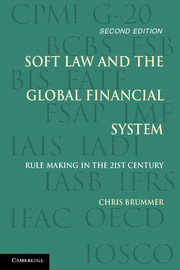Book contents
- Frontmatter
- Contents
- Preface to the New Edition
- Acknowledgments
- Key Abbreviations
- Introduction: The Perils of Global Finance
- 1 Territoriality and Financial Statecraft
- 2 The Architecture of International Financial Law
- 3 A Compliance-Based Theory of International Financial Law
- 4 How Legitimate is International Financial Law?
- 5 Soft Law and the Global Financial Crisis
- 6 Implementing the G-20 Agenda: A Transatlantic Case Survey
- 7 The Future of International Financial Law
- Index
3 - A Compliance-Based Theory of International Financial Law
Published online by Cambridge University Press: 05 November 2015
- Frontmatter
- Contents
- Preface to the New Edition
- Acknowledgments
- Key Abbreviations
- Introduction: The Perils of Global Finance
- 1 Territoriality and Financial Statecraft
- 2 The Architecture of International Financial Law
- 3 A Compliance-Based Theory of International Financial Law
- 4 How Legitimate is International Financial Law?
- 5 Soft Law and the Global Financial Crisis
- 6 Implementing the G-20 Agenda: A Transatlantic Case Survey
- 7 The Future of International Financial Law
- Index
Summary
In this chapter, we explore why – and to what extent – international financial law “matters.” Whatever their organizational diversity, the international institutions discussed in the previous chapter are ultimately designed to generate standards to be implemented across legal systems of different cultures and legal traditions. When international financial rules and standards are adopted robustly across borders, regulators are better able to ensure adequate cross-border supervision of market participants, no matter where they operate. Opportunities for arbitrage and regulatory competition are dramatically reduced, and enforcement cooperation and information sharing among jurisdictions is enhanced.
Thus ultimately, the effectiveness of international financial organizations depends on regulators complying with the rules that have been agreed to. As we have already seen, however, financial regulatory standards often have disparate costs and benefits across jurisdictions and are thus rarely self-enforcing. If a regulator deems certain rules disadvantageous to its domestic markets, it may fail to honor its commitments. Likewise, if a regulator “lacks confidence that others will do what they say, it has no incentive to take action itself.”
From this perspective, international financial law is a curious species of cross-border coordination. Unlike many areas of international economic law –for example, trade, where countries make formal commitments to specific practices by signing treaties – the commitments made by international financial organizations have no legal effect and are unrecognized and nonbinding as a matter of international law. If noncompliance carries no negative consequences, a national regulator can ignore best practices and standards, or it can cherry pick certain aspects of international agreements. A regulator could officially adopt certain standards but then under-enforce them or ignore them altogether.
Why then are most agreements, rules and standards used for the promulgation of international financial law non-binding? In this chapter, we see that international financial regulation, though formally a species of “soft law,” is bolstered by various disciplining mechanisms that render it, under certain circumstances, more coercive than traditional theories of international law predict. As a first-order principle, a regulator's record of compliance with international standards can affect its reputation, and with it, its ability to create coalitions and alliances in the future.
- Type
- Chapter
- Information
- Soft Law and the Global Financial SystemRule Making in the 21st Century, pp. 119 - 182Publisher: Cambridge University PressPrint publication year: 2015



